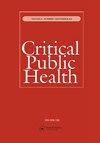Does ’class count’? The evolution of health inequalities by social class in early 21st century China (2002–2013)
IF 2.3
3区 医学
Q2 PUBLIC, ENVIRONMENTAL & OCCUPATIONAL HEALTH
引用次数: 0
Abstract
ABSTRACT Does social class matter in understanding health inequalities in early 21st century China, when the country experienced unprecedented social stratification? Using nationally representative data from the latest waves of China Household Income Project surveys, we examine to what extent an individual’s health is structured by social class and how that structure evolved. We draw on a neo-Marxist measure of social class to tap into the hidden mechanism that engenders and sustains inequalities. Four classes are defined based primarily on their relationships to productive resources: owners/managers, professionals/skilled workers, less-skilled workers, and farmers. Such a measure has not been considered in the health gradient literature in the Chinese context. Our results show that, despite remedial policies that helped mitigate economic inequalities, inequalities in health have mostly widened during the early years of the current century between the ‘haves’, who own productive assets and/or managerial authority, and the ‘have-nots’. In 2002, self-rated health (SRH) was not clearly associated with class rank; in 2007, when China’s economic inequality reached a historical zenith, a gradational pattern between SRH and class emerged, and the largest health gap was found between the class of owners/managers and farmers; in 2013, when China’s income inequality reached a plateau, the health gap between owners/managers and less-skilled workers grew larger. Further, we identify job security as a mediator that links class and health among the lower social strata. In addition to improving the health of the disadvantaged, policies designed to narrow health inequalities should be orientated towards addressing social stratification.“班级算数吗”?21世纪初中国社会阶层健康不平等的演变(2002-2013)
21世纪初,中国经历了前所未有的社会分层,在理解中国的健康不平等时,社会阶层是否重要?利用中国家庭收入项目最新一波全国代表性的调查数据,我们研究了个人健康在多大程度上受到社会阶层的影响,以及这种结构是如何演变的。我们利用一种新马克思主义的社会阶级衡量方法来挖掘产生和维持不平等的隐藏机制。主要根据他们与生产资源的关系定义了四个阶层:所有者/管理者、专业人员/熟练工人、低技能工人和农民。在中国背景下的健康梯度文献中没有考虑到这一措施。我们的研究结果表明,尽管补救政策有助于缓解经济不平等,但在本世纪初,拥有生产性资产和/或管理权的“富人”与“穷人”之间的健康不平等在很大程度上扩大了。2002年,自评健康(SRH)与班级等级关系不明显;2007年,当中国经济不平等达到历史顶峰时,社会健康水平与阶层之间出现了递进格局,最大的健康差距出现在业主/管理者阶层与农民阶层之间;2013年,当中国的收入不平等达到平台期时,业主/经理与低技能工人之间的健康差距变得更大。此外,我们确定工作保障是连接社会下层阶级和健康的中介。除了改善处境不利者的健康之外,旨在缩小保健不平等现象的政策应着眼于解决社会分层问题。
本文章由计算机程序翻译,如有差异,请以英文原文为准。
求助全文
约1分钟内获得全文
求助全文
来源期刊

Critical Public Health
Multiple-
CiteScore
5.90
自引率
7.10%
发文量
36
期刊介绍:
Critical Public Health (CPH) is a respected peer-review journal for researchers and practitioners working in public health, health promotion and related fields. It brings together international scholarship to provide critical analyses of theory and practice, reviews of literature and explorations of new ways of working. The journal publishes high quality work that is open and critical in perspective and which reports on current research and debates in the field. CPH encourages an interdisciplinary focus and features innovative analyses. It is committed to exploring and debating issues of equity and social justice; in particular, issues of sexism, racism and other forms of oppression.
 求助内容:
求助内容: 应助结果提醒方式:
应助结果提醒方式:


